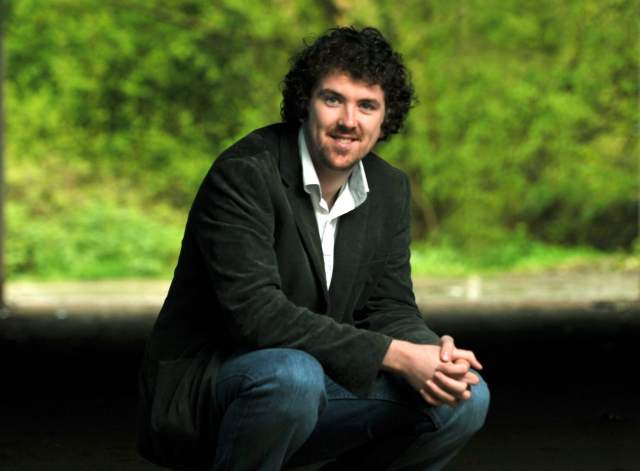
Relaxed mode: Composer Tom Davoren
Although still in his twenties, Tom Davoren has already developed into a musical polymath.
As a composer his music has gained increasing critical acclaim across the globe, and having been nominated for a British Composer Award in 2011, in the next few weeks his celebratory ‘VIVAT!’ will be used at the First Section National Finals in Cheltenham.
As a conductor he has enjoyed success with the BTM Band, whilst as an innovative entrepreneur he founded the Cardiff New Brass Festival, which has made a significant contribution to the performance of contemporary brass music in Wales.
Tom spoke at length to 4BR’s Chris Thomas about his creative life and how he fits it all in…..
Chris Thomas: You hail from the Gower Peninsula in South Wales. Could you tell us a little about your early musical interests and experiences?
Tom Davoren: I feel very lucky to have had a fantastic upbringing on the Gower coast, with an extremely loving and supportive family.
My first experience of music was through the piano. Although I cursed my mum at the time, I owe her a great deal for dragging a relentlessly opposing 10 year-old to lessons once a week!
At school in Llanelli my love for music started to flourish. Thanks to supportive teachers I became involved with various groups, but wanted to play an instrument that would get me into the school orchestra and wind band.
This time my ever supportive parents brought home for a demanding 14 year old, a euphonium - and about five weeks later a full sized BBb bass!
Chris Thomas: When did you first come into contact with brass bands and how crucial were they in your musical development?
Tom Davoren: My ‘first contact’ came through a friend who played in his local junior band, part of Burry Port Town Band. He persuaded me to go along for a blow.
My first concert experience was petrifying! I vividly remember playing a piece called ‘Square Dance’. I say playing: I got completely lost after the first bar and barely played a note!
Anyway, I was hooked.
Burry Port were incredibly supportive, notably conductor Mike Thorne and euphonium player Ceri John who, as local peripatetic teachers, helped me into the county music system - something new to me.
I eventually progressed into the main Burry Port Band where I experienced some of the most enjoyable years of my playing life, before moving to Buy As You View Cory and then PolySteel (Flowers) Band.
Chris Thomas: Whilst at college you developed Focal Dystonia, a condition that essentially ended your playing due to the collapse of your embouchure. That must have been devastating?
Tom Davoren: It’s really difficult to give a detailed answer to this.
I suppose the best way I can describe things is that I miss playing every day. To a point, I would give up anything for the simple pleasure of sitting at the back of a band again.
It really is a case of ‘you don’t know what you have until it’s gone.’
Chris Thomas: How did you set about re-inventing yourself as a musician?
Tom Davoren: Not really a re-invention, more finding another path with the help of some very thoughtful, generous friends and mentors.
After exploring every possible avenue to rescue my playing, through other instruments and performance medicine, it became apparent that I wouldn’t be able to finish my degree course.
So, I collected a diploma from the Royal Welsh College of Music and looked for other opportunities.
I had always composed for my own pleasure or for small brass ensembles I played in, so it seemed like a natural progression - a way of staying involved in music.
In 2007, I enrolled in the second year of an academic music undergraduate course at Cardiff University.
Chris Thomas: So composition was something that came to you fairly late?
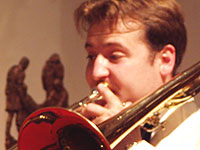 Tom Davoren: I made a point to choose various composition related modules during my course, but it was really my activity outside the university that fostered my passion.
Tom Davoren: I made a point to choose various composition related modules during my course, but it was really my activity outside the university that fostered my passion.
At the time I was living with my friend Jon Pippen (right), who had played with Brighouse & Rastrick and had been Principal Trombone of the Portuguese contemporary music orchestra, Remix Ensemble.
I wrote my first brass band work, ‘Diversions on Calon Lan’, for him in early 2008, which began my relationship with the BTM Band.
This was followed by Philip Harper commissioning ‘Prelude to a Celebration’ to celebrate the 40th anniversary of the Polysteel Band, and Nigel Seaman asking for a concert piece for Desford Colliery Band.
These works gave me much needed focus and returned me to the brass band movement. I will forever be indebted to these three gentlemen. I really believe they gave me back my musical voice.
I was also very lucky that my tutor at Cardiff, Professor Anthony Powers, saw merit in composing for brass bands and allowed me to include my works in my degree portfolio.
He even organised a full time research scholarship to allow me to undertake a Masters degree at the university.
Chris Thomas: You are now studying for a PhD under Professor John Pickard. What is the focus of your study at Bristol University and how are you enjoying it?
Tom Davoren: I’m incredibly lucky to have John as my supervisor. PhD research was never really something that I had considered until I realised it was the ideal way to spend time with someone whose music I have long admired.
We have musical similarities and differences, so we are never stuck for a topic to discuss, and I find our sessions act as regular ‘battery charges’ for my writing.
He never imposes a particular viewpoint or method, but his sessions are always geared to an alternate perspective. If anything, I feel that my PhD work at Bristol has given my writing a new sense of focus.
Chris Thomas: Do you find writing a hard fought battle, or do pieces tend to flow from you once they are started? What motivates and inspires you creatively?
Tom Davoren: I don’t need motivation to sit down and compose, just as playing the tuba never felt like a chore. I really struggle to think of a day where I haven’t somehow enjoyed making music.
I know that some composers and performers find it difficult to listen to music for pleasure, but I’m quite the opposite. Listening to music at home, in the car and going to concerts is a massive part of my life.
Chris Thomas: Your music is always tonal with a strong melodic vein, but also encompasses a range of stylistic influences.
How do you feel that you absorb external influences, and how crucial is it that your music communicates on a direct level with your audience?
Tom Davoren: Listening to music has been a central part of my life and without doubt it shapes my immediate influences which can creep into relevant pieces.
This is sometimes a very conscious decision, but can just as well be something, maybe a specific feel, which I only pick up on later.
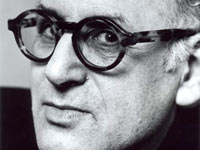 University life has been invaluable for my exposure to different repertoire on so many levels. My tastes are eclectic and I tend to listen in ‘blocks’ of genres.
University life has been invaluable for my exposure to different repertoire on so many levels. My tastes are eclectic and I tend to listen in ‘blocks’ of genres.
At present it’s Louis Andriessen, Michael Nyman (right) and John Adams centred on experimental minimalism, although I’m probably enjoying these due to their connection to progressive and stadium rock music - a life-long passion of mine.
I think that most composers care about how their music communicates. I know I certainly do.
Writing is an emotive process. I would say that in composing a piece, I feel subject to a gamut of emotion. Whether this is due to the subject matter or to the musical content can vary. It really doesn’t matter what someone feels when they hear or play my music, as long as they feel something.
This elicits thought, and with thought comes interpretation, which in turn forms opinion; four things which art cannot survive without.
Chris Thomas: An important early work was, ‘Visions of Kolkhis’, which you wrote for Leyland for Brass in Concert in 2009. How significant was this?
Tom Davoren: ‘Kolkhis’ proved to be very significant.
Until then, the majority of my work had been performed through my university courses or with the BTM Band, so I owe Leyland and Jason Katsikaris in particular, a debt of gratitude.
He had moved from BTM to Leyland as MD and through our friendship he approached me to compose ‘Kolkhis’. Writing the piece was an enjoyable ‘two way’ process. He is so full of musical energy, and is in my opinion one of the finest interpreters of music I have ever met - in or out of the brass band movement.
As a result, I’ve enjoyed working on a project with him each year since 2009, including adjudicating in Australia, recording my ‘Euphonium Concertino’ with Glenn Van Looy and more recently recording my ‘Baritone Concerto’ with Kristy Rowe.
As a friend he has always been there for me – from advice to a general chat, despite the fact that he now lives on the other side of the world. He really is a great guy.
Chris Thomas: Your autobiographical ‘Looking In’, was nominated for a British Composer Award in 2011, and traces your musical journey. Was it a work you needed to write as a form of creative therapy?
Tom Davoren: You can’t help but inject aspects of your personality into your work.
‘Looking In’ is a fairly literal piece. I’m not one of life's great talkers, so I found it certainly allowed me to draw a line under the dystonia chapter of my life.
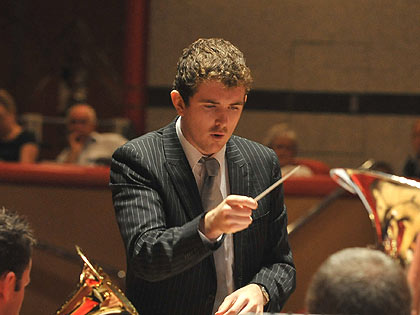
A youthful Davoren with BTM
Chris Thomas: You made your mark as a conductor early on in your career. Is it a vocation that you wish to pursue further?
Tom Davoren: I remain very grateful to BTM. They took a massive risk on me as MD aged just 21, but looking back I think we achieved something worthwhile.
At contests we only missed out on the top six in 3 of 20 outings, whilst we promoted new music at every opportunity - something I’m still very proud of. It was sad it came to an end, but it was something that I feel happened for the right reasons at the right time.
I’ve still kept my hand in conducting up and down the sections over the past year, and the freelance approach fits nicely alongside my current career.
Chris Thomas: The founding of the Cardiff New Brass Festival (CNBF) has been a vital innovation over the last few years. What drove you to launch the Festival?
Tom Davoren: It initially came from a chance conversation between Lucy Pankhurst, Pete Meechan, Simon Dobson and myself in 2009.
We spoke about Paul Hindmarsh’s excellent promotion of the RNCM Festival of Brass and how it was interesting that no one had really followed his example in a different region.
A couple of days later I approached Cardiff University who gladly hosted the first eventl and Pete, Simon and Lucy, along with Welsh composers Gareth Glyn, Bill Connor, Adrian Clifford and Mervyn Burtch all donated works.
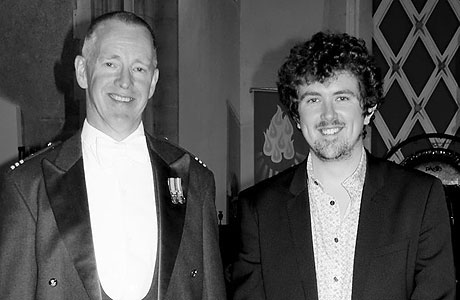
Taking wings: Cardiff Festival link with the Central Band of the RAF
Chris Thomas: How do you hope to the see the Festival develop over the next few years?
Tom Davoren: I feel that the future is not necessarily running an annual event but acting as an intermediary for composers and performers, both local and international, here in Wales.
So far it’s been funded by generous corporate sponsorship rather than by government grants, which offers a sense of flexibility to how things can evolve.
So far seven works for brass ensemble or brass band have been created that would not have otherwise existed, whilst young musicians from local beginner groups to higher education have been able to share the stage with performers such as David Thornton, Dean Wright, Oslofjord Brass and the Central Band of the Royal Air Force.
In 2012 the Festival’s activity was to donate new works, composed by Paul McGhee, Andy Keenan, Richard Rock and myself, to the British Trombone Society and the Royal Welsh College of Music and Drama.
As long as Cardiff New Brass Festival can keep offering opportunities to composers and performers, I will be thrilled.
Chris Thomas: You have become actively involved with wind bands and now produce the journal of BASBWE, ‘Winds’.
How do you enjoy writing for the medium and is there anything that the brass band world should be learning from the thriving wind band scene?
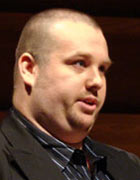 Tom Davoren: Writing for wind orchestra is a totally different challenge, but I would say that I find both disciplines rewarding.
Tom Davoren: Writing for wind orchestra is a totally different challenge, but I would say that I find both disciplines rewarding.
The big difference is the willing attitude they encourage toward embracing the new, across bands of varying abilities.
This is due in no small part to the sterling work that Pete Meechan (right) has done in turning around the UK scene in his role as Chair of the British Association of Symphonic Bands and Wind Ensembles (BASBWE).
I do feel brass band administrators should look to their model for ideas on inclusive music making.
The association supports a number of regular regional workshops, masterclasses and festivals, all of which are focused around involvement.
Conductors, performers, listeners and composers all interact on an equal footing in a creative, non-competitive setting.
This reinforces the most important element of what we do - namely enjoyment and bringing people together, whist still promoting new music and ideas.
Chris Thomas: Your new work ‘VIVAT!’ will test the bands at the First Section National Finals, an occasion you must be looking forward to. Was it part of the commission brief that the piece be a celebration of the Queen’s Jubilee?
Tom Davoren: In a way yes. Through Paul Holland the Kapitol Selection Panel initially made contact, suggesting that they wanted to commission a piece. Working together we ended up with something about the Jubilee.
Given the success of Philip Harper’s Olympic themed area test piece, it seemed an obvious choice, and it seems that the Jubilee/British theme is also being followed in the Third and Fourth Section too.
I’m really thrilled that Kapitol have shown such faith in my music.
I only hope that bands and conductors enjoy the music in addition to it fulfilling its role as a contesting work.
Chris Thomas: So there’ll be a few nerves for you on the day?
Tom Davoren: Absolutely - particularly given ‘VIVAT!’s’ commission meant we were unable to run the piece with a band before release.
Chris Thomas: Are you optimistic about the future of banding, and in what ways do you feel that it needs to develop or change to ensure a positive future?
Tom Davoren: I’ve enjoyed a break from conducting on a full time basis. The main reason was to remove myself from the intense pressure that comes with regular competition.
I’m not one of those people who refer to contesting as ‘a necessary evil’, as it’s an important part of our heritage. I do believe though that too great an emphasis on contesting can stifle creative ambition.
What concerns me is the apparent confusion between heritage and identity.
The movement is an exciting place to be at the moment. A new sense of creativity seems to be slowly ‘challenging’, or perhaps ‘balancing against’ the drive towards technical perfection demanded by contesting.
If we can use the creative climate to foster excitement amongst bandsmen and develop our audience base then there is certainly some light on the horizon.
This is very much an ‘if’ though, and it all depends on the movement’s willingness to evolve.
Chris Thomas: In addition to completing your PhD what are your musical plans for the immediate future?
Tom Davoren: I’m lucky to have enough projects to keep me busy over the next twelve months!
Away from composing I’m really enjoying being part of the team at Brass Band World magazine, having just finished my second edition as Reviews Editor and my ‘day job’ as a copyist for a private company is also great fun.
Chris Thomas: Thanks for talking to us Tom and we look forward to hearing ‘Vivat!’ at Cheltenham in September.
You can find out more about works commissioned by CNBF visit the website: www.tomdavoren.co.uk













